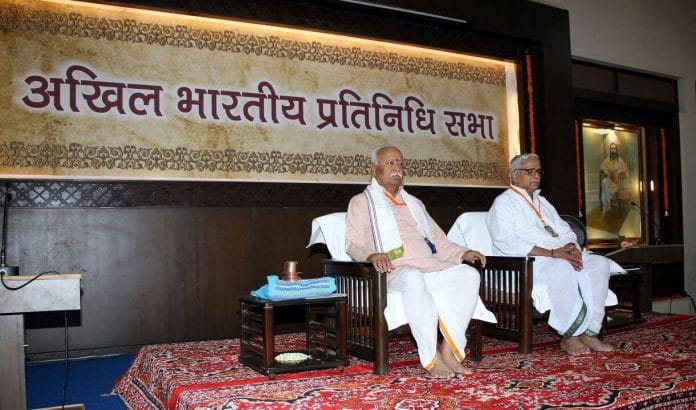The Bharatiya Shikshan Mandal wants to bring together gurukuls from different countries and practices, and develop a modern gurukul system for implementation.
New Delhi: One of the main aims of the Rashtriya Swayamsewak Sangh (RSS) is to spread Bharatiya sanskriti – Indian culture – across the world. To achieve this, partially, the RSS, through its affiliate Bharatiya Shikshan Mandal (BSM), is all set to host an international event from April 28-30 at Ujjain, Madhya Pradesh.
Aimed at popularising the gurukul system of education that existed in ancient India, the mega event will see participation from gurukuls from Nepal, Bhutan, Myanmar, Sri Lanka, Tibet, Mauritius, Trinidad & Tobago, Indonesia, Canada, Norway, and the Netherlands.
MP CM Shivraj Singh Chouhan is the official host, while union human resource development minister Prakash Javadekar is also associated with the event.
RSS chief Mohan Bhagwat and sarkaryawaha (general secretary) Suresh ‘Bhaiyyaji’ Joshi, along with several other leading lights of the RSS and the BJP, will be present.
“To re-establish the gurukul system of education in the society to prevent deterioration of education is an important task,” states the BSM invite.
Different countries and practices on the same stage
While several countries will be participating in the event, it is learnt that Indonesia has also approached India to help set up 15 gurukuls in the country.
Gurukuls following many different practices — from idol worshipping to Arya Samaj — will share a stage for the first time, in a bid to assimilate teaching techniques suited to today’s world from each other.
A gurukul thus customised to suit the contemporary world can become an effective alternative system of education, and efforts to mainstream it can then be successful, say BSM functionaries.
“The objective to bring gurukuls that practice different methods of education and curriculum is to share problems, experiences, experiments. We can gain immensely in making this form of education more diverse, and suited to today’s requirements,” said Mukul Kanitkar, national organising secretary of the BSM.
While a lot of modern gurukuls run on Vedic traditions, BSM’s gurukuls have integrated contemporary education with the traditional.
“Our education has a 360-degree outlook. It is wholesome. It has five parts (to be taught over 12 years) that covers almost everything,” said Kanitkar.
These parts are:
1. Vedas plus Sanskrit teachings — While Jain and Buddhist gurukuls have different curriculums, BSM teaches shaastras and Vedas.
2. Science — Ayurveda and modern science.
3. Kala — Skill development; performing arts; skills that make one self-reliant. If a student chooses to become a chef, the training includes growing ingredients used in modern kitchens.
4. Yoga — In theory and in practice.
5. Krishi — Agriculture and animal husbandry, including cow rearing.







It is better than that. Santiniketan also had Gurukul system and produced great people. Learn to appreciate your roots. If not, you will be like a tree without roots.
So madarasas vs gurukuls. It is just Sanskrit -ising and brahmin-ising, after going through it’s curriculum.